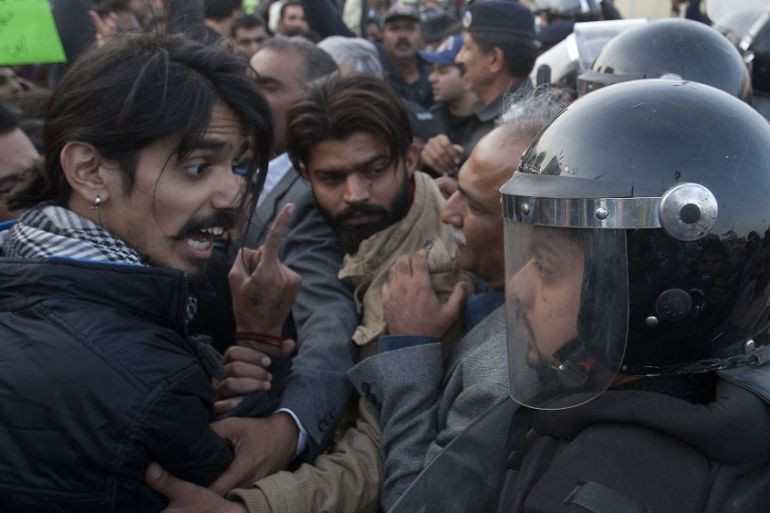Missing activist Salman Haider reunited with family
Salman Haider and Ahmed Raza Naseer say they are safe, as fate of three others – missing for weeks – remains unclear.

Islamabad, Pakistan – One out of five disappeared Pakistani activists has been released and is back with his family, and another one has made contact with his relatives, Al Jazeera has learned, three weeks after the men first went missing.
Salman Haider and Ahmed Raza Naseer made contact via a telephone call earlier on Saturday, family members told Al Jazeera, without offering comment on their relatives’ current whereabouts.
Keep reading
list of 4 itemsWhat happens when activists are branded ‘terrorists’ in the Philippines?
Are settler politics running unchecked in Israel?
Post-1948 order ‘at risk of decimation’ amid war in Gaza, Ukraine: Amnesty
Later on Saturday, Zeeshan Haider, Salman’s brother, confirmed his release.
“He’s with the family, and we’re happy that he’s back,” Zeeshan Haider told Al Jazeera. “He’s in good condition [in terms of his health].”
The disappearances prompted a series of protests by rights groups across the country, calling for the government to locate the men, or for them to be produced in a court to face formal charges if they had been detained by the state’s intelligence agencies.
Haider – a noted progressive activist, poet and university lecturer – was abducted while on his way home on the outskirts of the Pakistani capital Islamabad on January 6, family members told Al Jazeera earlier.
Naseer was abducted from his electronics shop in his native village just outside the town of Nankana Sahib in Punjab province on January 7, his family said.
READ MORE: Silencing Pakistan’s activists
The two men were among five activists who disappeared over the course of four days across Punjab province and from Islamabad.
There was no immediate word on the whereabouts of the other three men, Waqas Goraya, Asim Saeed and Samar Abbas, on Saturday.
“He is safe and has made contact with us on the telephone,” said Tahir Raza Naseer, Ahmed’s brother. “He did not say who had taken him.”
Haider’s family had also made a similar statement.
“He has been in contact with the family, and the police should be consulted for further details,” said a close family member, on condition of anonymity given the sensitivity of the subject.
“We are still looking into these reports and will make a statement later,” said Naeem Iqbal, a spokesperson for the Islamabad Police.
READ MORE: TV host Aamir Liaquat banned over ‘hate speech’
The Civil Progressive Alliance of Pakistan, a progressive human rights groups based in the southern city of Karachi, issued a statement saying the whereabouts of its president, Samar Abbas, were still unknown.
“Samar Abbas, president of Civil Progressive Alliance Pakistan is still missing and family have not been contacted by any official yet,” said a statement posted on their official Facebook page on Saturday.
It remains unclear who abducted the men.
The issue of enforced disappearances is not new for Pakistan. Rights activists allege that there are thousands of people who have been “disappeared” by the state, with some allegedly killed while in custody.
In December, the government’s Commission on Enforced Disappearances reported that the bodies of 936 missing persons had been found in Balochistan province alone since 2011.
The Pakistani government denies any wrongdoing, and, in the case of the five activists, the interior ministry said it was “making every possible effort for [their] safe recovery”, according to a statement released last week.
OPINION: Pakistan’s violent cyberspace – No place for dissent
Zohra Yusuf, chairperson of the Human Rights Commission of Pakistan (HRCP), urged the ministry to make information about the case public.
“It is incumbent upon the interior minister to bring the facts before the people, because he said he was personally pursuing the case,” she told Al Jazeera. “I think it’s his responsibility to come up with the reasons that they were taken, otherwise no one knows who is going to be next, and this practice will continue.”
Since their abduction, the five men have been repeatedly accused on social media, and in some mainstream outlets, of committing blasphemy, a crime that carries a judicial death sentence and, increasingly commonly, the threat of extrajudicial murder by right-wing vigilantes.
The families of all five activists deny the blasphemy allegations.
Some of the rights activists calling for the release of the disappeared men were also later accused of blasphemy.
At least one protest calling for the men’s release was attacked by stone-throwing right-wing counter-protesters on January 19.
Asim Saeed’s family were forced to relocate from their home on Thursday, after receiving death threats via telephone based on the blasphemy allegations.
“[The caller] said that he would kill me and also kill [Asim’s] children, and then burn our house down,” said a family member, speaking on condition of anonymity.
Saeed is one of the three activists whose whereabouts remain unknown.
At least 68 people have been murdered in relation to blasphemy allegations in Pakistan since 1990, according to an Al Jazeera tally.
|
|